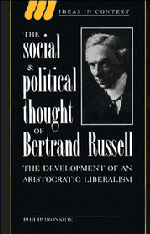Book contents
- Frontmatter
- Contents
- Acknowledgements
- Introduction
- 1 A young man of character
- 2 Fellow-travelling with the Fabians
- 3 Out of the moral gymnasium
- 4 Political science
- 5 The sage of Caxton Hall
- 6 Anarchist tendencies
- 7 Russia, China, and the West
- 8 The Wellsian trajectory
- 9 Ideologies and dystopias
- Epilogue: Russell and the idea of the clerisy
- Notes
- Bibliography
- Index
- IDEAS IN CONTEXT
7 - Russia, China, and the West
Published online by Cambridge University Press: 31 August 2009
- Frontmatter
- Contents
- Acknowledgements
- Introduction
- 1 A young man of character
- 2 Fellow-travelling with the Fabians
- 3 Out of the moral gymnasium
- 4 Political science
- 5 The sage of Caxton Hall
- 6 Anarchist tendencies
- 7 Russia, China, and the West
- 8 The Wellsian trajectory
- 9 Ideologies and dystopias
- Epilogue: Russell and the idea of the clerisy
- Notes
- Bibliography
- Index
- IDEAS IN CONTEXT
Summary
In 1895 Russell, with his academic future undecided, had gone to Germany with his new wife to examine the prospects of a revolutionary Socialist party. In 1920, with his academic future undecided, he planned to go to Russia with if not a new wife then a likely contender for the role, to examine the prospects of a revolution. The symmetry was somewhat spoiled by his abandoning Dora Black in favour of a Labour Party delegation, but the similarities are maintained in the published results to the extent that both German Social Democracy and The Practice and Theory of Bolshevism offer a bleak perspective on possible Socialist imports. Although this suggests a certain consistency of purpose, no such consistency is to be found in Russell's choice of political labels; and whereas his later claim that he wrote German Social Democracy as an ‘orthodox Liberal’ has some substance, his assertion that he ‘went to Russia a Communist’ can only confuse.
For the 1949 edition of Practice and Theory Russell ‘found it necessary, in order to conform to modern usage, to alter the word “Communism” to “Socialism” in many places’, maintaining that ‘in 1920, there was not yet the sharp distinction between the two words that now exists, and a wrong impression would be made but for this change’.
- Type
- Chapter
- Information
- The Social and Political Thought of Bertrand RussellThe Development of an Aristocratic Liberalism, pp. 146 - 161Publisher: Cambridge University PressPrint publication year: 1995



